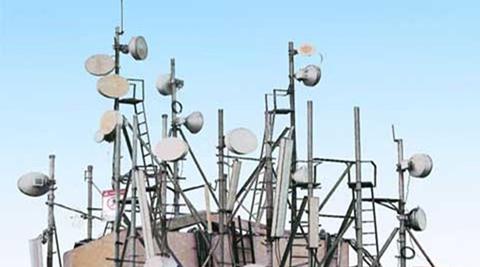In a setback to telecom companies, the Supreme Court on Friday held that municipal bodies can levy property tax on mobile towers and equipment on rooftops and building terraces as “the incidence of the tax is not on the use of the plant and machinery in the mobile tower; rather it is on the use of the land or building, as may be, for purpose of the mobile tower”.
A bench headed by Justice Ranjan Gogoi, while setting aside the Gujarat High Court’s April 2013 order that held contrary to its, view said: “We do not find any reason as to why, though in common parlance and in everyday life, a mobile tower is certainly not a building, it would also cease to be a building for the purposes of Entry 49 List II (of the Seventh Schedule to the Constitution) so as to deny the State Legislature the power to levy a tax thereon.” It said that it will be difficult to confine the meaning of the expression “building” to a residential building as commonly understood or a structure raised for the purpose of habitation. “A dynamic, rather than a pedantic view has to be preferred if the constitutional document is to meet the challenges of a fast developing world throwing new frontiers of challenge and an ever changing social order,” Justice Gogoi, writing for the bench, said.
According to him, under the relevant laws including the Gujarat Provincial Municipal Corporations Act 1949, tax on mobile towers is “levied on the yield from the land and building calculated in terms of the rateable value of the land and building. Also the incidence of the tax is not on the use of the plant and machinery in the mobile tower; rather it is on the use of the land or building, as may be, for purpose of the mobile tower,” the judge said, adding that the tax imposed on the “person engaged in providing telecommunication services through such mobile towers” (Section 145A of the Gujarat Act) merely indicates that it is the occupier and not the owner of the land and building who is liable to pay the tax.”
Such a liability to pay the tax by the occupier instead of the owner is an accepted facet of the tax payable on land and building under Entry 49 List II of the Seventh Schedule, the ruling stated.
However, the top court left it open for the cellular operators in the Mumbai cases to agitate the issue with regard to the retrospective operation of the assessment/demand of tax and the quantum thereof before the appropriate forum.
Cross-appeals were filed by various companies including Reliance Communications, Idea Cellular, Viom Infra Networks, GTL Infrastructure, among others, and various municipal bodies from Gujarat. The companies had challenged the levy of property tax for cell towers and equipment installed on rooftops and building terraces on the grounds that the telecom towers are temporarily installed for the functioning and operation of a mobile telephone system. The Gujarat HC had declared Section 145A of the Gujarat Act as ultra vires the Constitution and held that the cabin in a mobile tower, in which the base transceiver station (BTS) system is located, would be a building and, therefore, exigible to tax under the Gujarat Act. However, the Bombay High Court had refused to entertain the cellular operator’s plea against such levy.
In technical terms, a mobile tower is called a ,base transceiver station, which has a pre-fabricated shelter made of insulating PUF material made of fibres, electronic panel, base transceiver station (BTS) and other radio transmission and reception equipment. It also consists of a diesel generator set, six poles of 6 to 9 metres length, each made of hollow steel galvanised pipes. A mobile tower is constructed either on vacant land or on the terrace of existing buildings on the basis of agreements with the owners of such properties.


